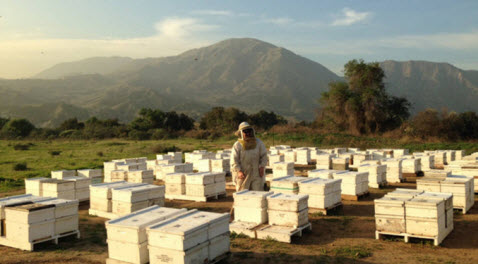
Commercial Beekeepers: The Unsung Heroes of the Nut Business
Share

An employee of Bill’s Bees prepares hives for transportation to almond groves. Credit: Tracey Samuelson/Marketplace
(Every year about this time, Bill's Bees takes part in the greatest pollination event in the universe - almond pollination. In 2015, Tracy Samuelson featured Bill's Bees in her piece for Marketplace, (it's reposted below in its entirety). Enjoy!)
"Commercial Beekeepers - the Unsung Heroes of the Nut Business"
"Bill Lewis is waiting for the sun to set, the time of day when his bees crawl back inside the short white boxes that house their colonies. As the sky turns pink behind the San Gabriel mountains, on the outskirts of Los Angeles, Lewis climbs into the seat of a forklift and starts moving the hives onto the back of a flatbed truck. These bees are on the move.

The best time to transport bees is after dusk, when they return to their hives for the night. Credit: Tracey Samuelson/Marketplace

Bill Lewis of Bill’s Bees loads several hundred hives onto trucks in Lake View Terrace, CA., in order to drive them a couple hours north to pollinate almond trees for a few weeks. Credit: Tracey Samuelson/Marketplace
"As soon as you get on the freeway and there’s air flowing past the entrances, all the bees run back inside,” says Lewis, of any stragglers.
Lewis, who runs Bill’s Bees, is taking about 700 of his hives on a road trip to the California’s Central Valley, where he’ll unload them across acres of almond orchards, working until 1 or 2 a.m. under the light of full moon.
All across the country, more than a million-and-a-half colonies are making a similar journey – traveling hundreds or even thousands of miles to pollinate California’s almonds. Farmers rent hives for few weeks because in order for almond trees to produce nuts, bees need to move pollen from one tree to another.
No bees, no almonds.
“This pollination season there will be [some] 800,000 acres of almonds that need to be pollinated,” says Eric Mussen, a honey bee specialist at the University of California Davis. He says more than 100 different kinds of crops need these rent-a-bees, but almonds are significant for the number of acres that require pollination all at the same time. About 85 percent of the commercial bees in United States – which Mussen calls “bees on wheels” – travel to California for almonds.
The state supplies roughly 80 percent of the world’s almonds, worth $6.4 billion during the 2013-2014 season, according to the Almond Board of California.
“It’s a matter of numbers,” he says. “You’re trying to provide enough bees to be moving the pollen around between the varieties and whatnot. It’s just a huge, huge number of bees. The only way we can get a huge number of bees in one place at one time is to bring them in on trucks.”
In fact, bees are such an important part of the almond business that Paramount Farms, one of the biggest almond growers in the world, has decided they need to be in the bee business, too. The company just bought one of the largest beekeepers in the United States, based in Florida.
“Bees are so essential for the process of growing almonds,” says Joe MacIlvane, Paramount’s president. “If we don’t have a reliable supply of good strong colonies, we simply won’t be a viable almond grower, so that’s our primary motivation for getting into the business.”
Renting bees is about 10 to 15 percent of Paramount’s production costs, but the motivation to keep their own bees isn’t simply economic.
“Many bee keepers are individual or family business and many people are getting on in years and we don’t see a lot of young people coming into the business,” says MacIlvane.
Additionally, bee populations are struggling. A significant number having been dying each year for the past decade or so, thanks to a mix of factors, from pesticides to lost habitat for feeding. Sometimes it’s difficult to know exactly what’s killing them.
“We had a large problem last year with bees dying in the orchard because of something that was going on during bloom,” says Bill Lewis. He thinks a pesticide or fungicide may have been to blame.
This year, Lewis and his bee broker are being pickier about the farms they’re working with, vetting them more carefully because those lost bees had big economic consequences – about $300,000 in lost income for Lewis."
Featured in: Marketplace for Monday March 2, 2015 (Click here for Radio Interview
